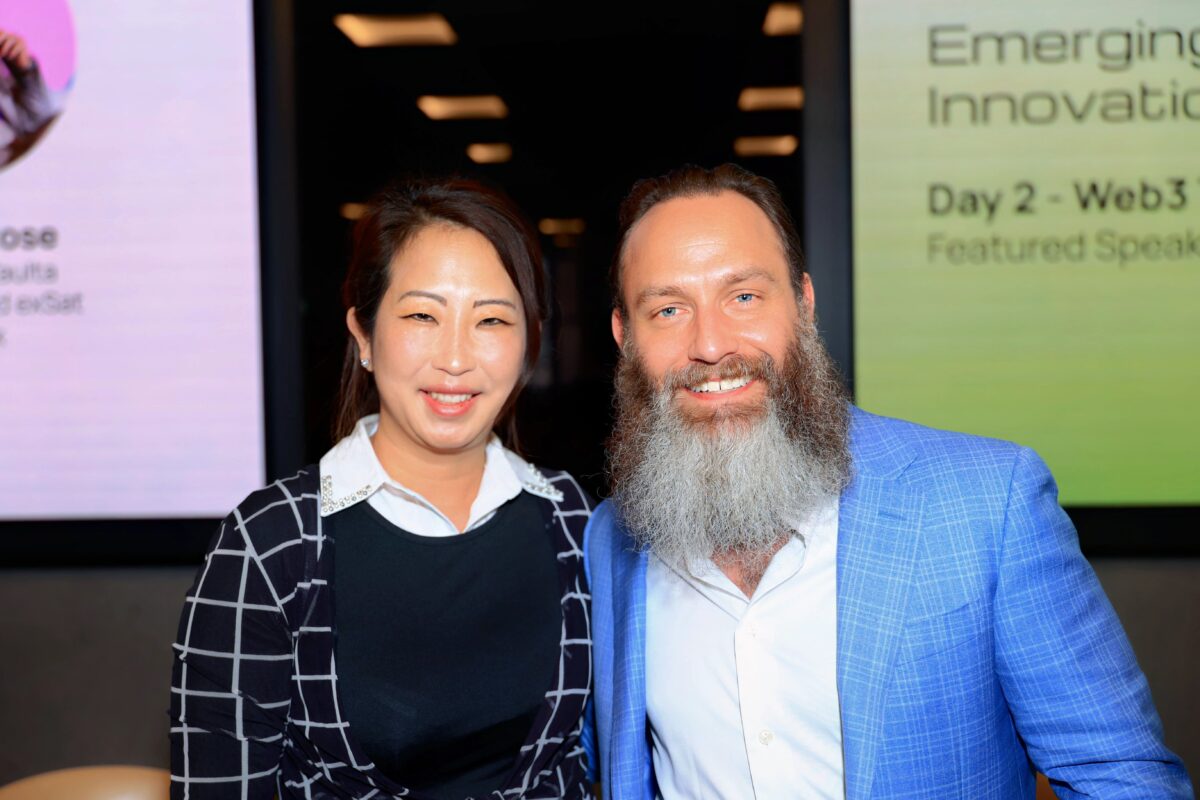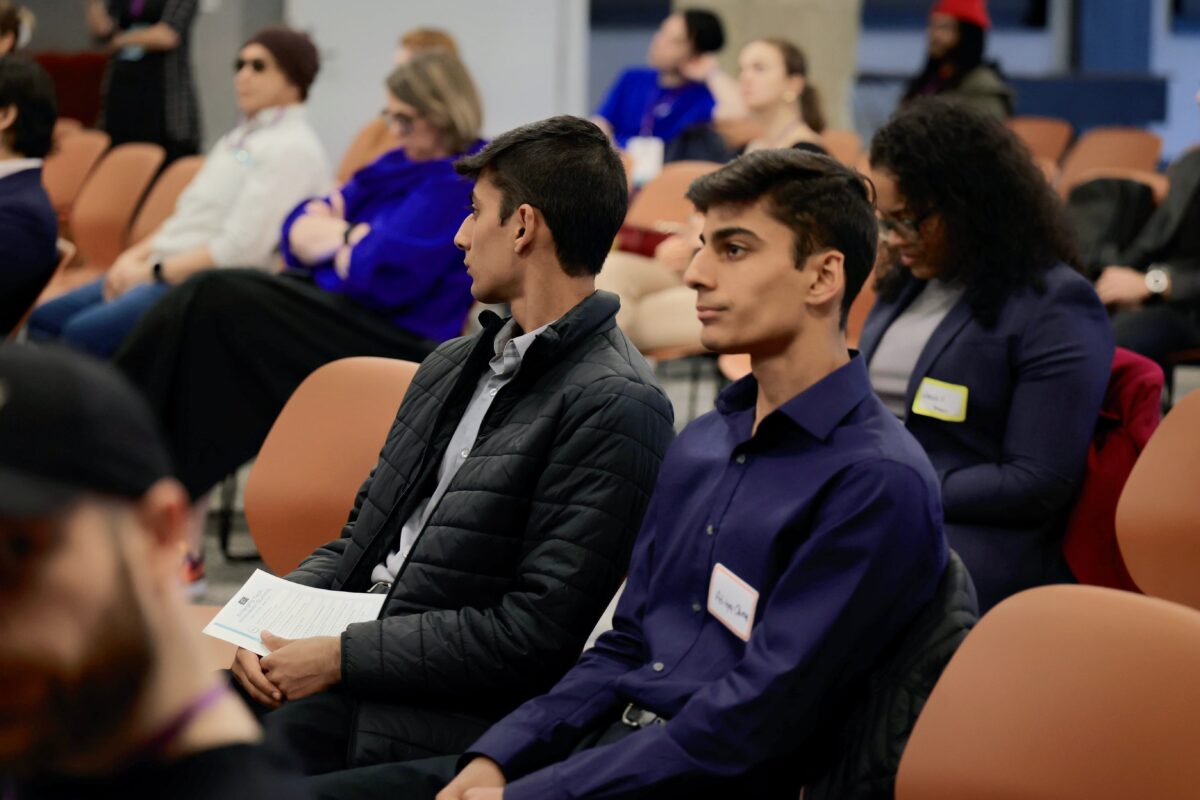On Wednesday, April 16, AI and Web3 experts, founders, and aficionados filed into 1871 for the Emerging Tech Innovation Summit, the final Summit to take place in 1871’s Merchandise Mart space. With over 800 registrants, more than 30 speakers, and an impressive host of presenting startups, this was the biggest Summit to date, and the excitement for AI and Web3 innovation was tangible.
The two-day immersive event featured a curated agenda of keynote conversations, breakout sessions, panel discussions, pitch showcases, and a Startup Expo, creating a comprehensive experience designed to unpack the current AI and Web3 climate and explore the future of these industries. In her opening remarks, 1871 CEO Betsy Ziegler said, “AI and Web3 are not buzz words, they’re tools with the potential to reshape how we work, how we build trust, how we govern, and how we create value.” These ideas, and more, were tackled throughout the Summit. Here are the highlights.
Emphasizing Accessibility
“Decentralized AI is all about access,” said Kyle Schneps, Director of Public Policy at Digital Currency Group. “Web3 has the ability for students, small businesses, independent developers, hobbyists, whoever it may be, to have access to the building blocks of AI technology.” The word ‘accessibility’ was perhaps the most-used word over the course of the two days. As AI and Web3 technologies develop at an exponential rate, one of the biggest ensuing societal changes pertains to access, which comes with both previously-unimaginable benefits and risks to be wary of.
Brigitte Piniewski, GBBC Healthcare Ambassador, discussed how Web3 is opening up previously unavailable information, for instance, data about cancer that can be used to combat today’s increasing rates in young people. Schneps emphasized that now, there is an opportunity to level the playing field with the top companies that are dominating AI technologies. However, while this modern availability of information and tools engenders opportunities for positive change, there is also worry in the emerging tech space of a society that becomes too dependent on these technologies as a result of accessibility.


Bearing Responsibility
With great power comes great responsibility. Throughout the Summit, many speakers made references to sci-fi films, like Blade Runner and Idiocracy, fictional examples of artificial intelligence that, while not completely accurate to today’s technology-driven world, serve as warnings of the potential risks of emerging technologies.

As experts at the Summit discussed the future of AI and Web3 developments, they emphasized the importance of reflecting on our values, as a society and as individuals, and allowing that to guide our approach to evolving technology.
Arry Yu, Advanced Technologies Serial Entrepreneur, highlighted the need to take a step back and asked audience members to question, “What are we trying to build for ourselves, for our society, for humanity for the next generations? What is the world that we are creating, and how do we get there?” In conversation with Yu, Yves La Rose, CEO of the Vaulta Foundation, explained that what determines people’s success with emerging technologies is dependent on their input, meaning it is important to teach people to use emerging technologies as a tool, not as a crutch. “How can we teach people, kids, good values so that they can interact with these tools? Because these tools are agnostic, they’re not going away,” he said.
AI and Universities

Another key conversation topic related to leveraging AI in the classroom setting. As multiple speakers stated, it is impossible to completely regulate students’ use of AI. Thus, it is important for educators to help students utilize AI as a tool.
“How we train the workforce of today can really inform the kind of leadership we see in five, ten years from now,” said Aravinda Garimella, Assistant Professor of Business Administration at the Gies College of Business. Additionally, because AI is evolving at a rapid rate, it is also the role of educators to teach students — future innovators and leaders — to adapt quickly.
The Myth of Next Big Thing
In her panel, The Myth of the Next Big Thing, Sierra Clouse, Managing Partner at Barclo Venture Studios, discussed how the idea that AI is a stand-alone development is a myth. “There is no singular ‘next big thing,’” she said. “There are connected curves, waves of innovation that enforce, accelerate, and unlock one another.” Clouse used examples like Y2K and cloud computing to demonstrate that, while at the time, these innovations felt huge and distinct, these were evolutions that allowed for the current landscape of AI. Through her conversation, she emphasized that “sometimes, the biggest breakthroughs aren’t the ones that we hype, they’re the ones that we build on.” Her conversation put into perspective the decades of groundwork that brought technology to today’s state, dispelling the common concern that AI is this scary new technology, taking over the world out of nowhere.
Pitch Perfect
Four startups were selected from each track (AI and Web3) to participate in the Pitch Showcase and demonstrate their innovative solutions to a panel of judges, as well as a room full of potential investors, partners, and customers. Congratulations to the four startups that took home an award at the Emerging Tech Pitch Showcase!

AI Judges Choice Award: John Abrams, nutrād
Nutrād is a smart infrastructure that links commerce and removes friction by building smart, self-correcting connections between brands, distributors, and retailers.
AI People’s Choice Award: Al Lagunas, Levee
Levee is revolutionizing hotel operations by introducing AI agents that automate room inspections, inventory tracking, task prioritization, and data capture — streamlining processes that were once manual and time consuming.
Web3 Judges Choice Award: Jeff Gaus, The Provenance Chain Network
The Provenance Chain Network delivers supply chain transparency as a service, serving a wide range of industries including consumer packaged goods, footwear and apparel, housing and construction, and the aerospace and defense sector.
Web3 People’s Choice Award: Anthony Peltier, Pantheon
Pantheon Trading Card Game is a multi-player, high-stakes blockchain bluffing game built on WAX ™ that lets you play for keeps.
In addition to the pitch showcase, members of the AI and Web3 Innovation Labs Portfolios had the chance to display their solutions at the Startup Expo. More than 25 founders set up tables to present their innovative companies, answer questions, and connect with potential investors and partners.
About the AI and Web3 Innovation Labs
The AI and Web3 Innovation Labs offer focused experiences, designed to connect key figures in the industries and maximize the chances of high-impact collisions. Through the Labs, members accelerate the growth of their solutions and sharpen their competitive edges with strategies and partnerships discovered at 1871.
The Innovation Labs Portfolio is an exclusive opportunity for growth-stage startups in our Innovation Labs community to be highlighted in various ways throughout the year and prioritized for corporate and investor connection opportunities.
Thank you to our partners for making this Summit possible: ETH Chicago, GBBC, FinTech4Good, Fenwick, Why of AI, Microsoft, Aon, Discover, DeVry University, EX3 Labs
Join as an 1871 Early Stage Member.
Attend info sessionSubscribe to our ICYMI newsletter.
Share this post:
